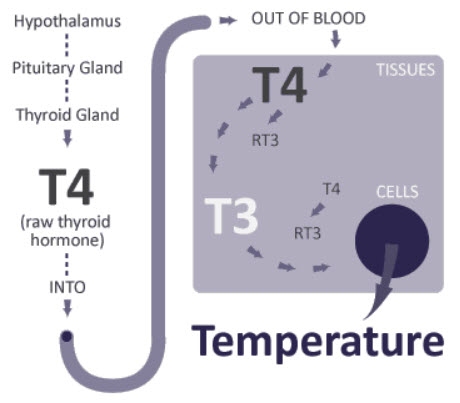PCOS Women Need a Thorough Diagnostic Workup for Hypothyroidism
If you have PCOS and discover that you have an underactive thyroid, and you get it back to optimal function, some of your symptoms may diminish. So it's important to get a full evaluation.
Thyroid disease is diagnosed by your symptoms, an exam and lab tests. If your doctor suspects a thyroid problem, he or she will typically order a TSH (thyroid stimulating hormone) lab test.
Free PCOS Newsletter
If your TSH test comes back normal, you may be told that your thyroid is fine and that if you are depressed and can't lose weight, maybe you should take an antidepressant and go on a diet to lose weight. The implication is that it's "all in your head".
How Does TSH Work?
TSH is a hormone produced by the pituitary gland, which "reads" the blood passing through it for proper amounts of thyroid hormone.
If thyroid hormone levels are low, the pituitary sends out a TSH signal to the thyroid to produce more thyroid hormone. As thyroid hormone production drops, TSH usually increases. Therefore a higher than normal TSH level indicates a hypothyroid condition.
How Accurate is the TSH Test?
Unfortunately, TSH doesn’t always respond correctly to low thyroid hormone levels. If symptoms persist, and the TSH is in the normal range, the thyroid hormones (T4 and T3) should also be checked. In some cases, a diagnosis of hypothyroidism can be missed if TSH is the only hormone that is measured.
There is a growing awareness in the medical community that the current reference range for determining what is a "normal" TSH is too wide. Based on newer data, the American Association of Clinical Endocrinologists recommends that the normal reference range for the TSH blood test be reduced by nearly half, down to 0.50-2.50 from the current 0.50-5.00. Other sources suggest the new upper range should be 3.33. (The higher the number, the more hypothyroid you are.) Until all physicians and labs can agree on a new range for TSH, many women with PCOS will continue to be frustrated by inaccurate diagnosis.
Other Limitations of TSH
Remember that the TSH test only checks for ONE of the hormones related to thyroid function. So what else might be going on? A lot of things. There is a complex interplay between your thyroid hormones and other hormones. There is also an interplay between your (internal and external) environment and thyroid hormones. And, there is the conversion of thyroid hormones into other thyroid hormones.
A TSH test is a start but not enough. Here's why. There is some research evidence to suggest that people with metabolic disorders may have normal thyroid hormone levels even though the TSH is elevated. So if your doctor prescribes thyroid hormone therapy based only on your TSH, there is some risk the hormone therapy could raise your thyroid hormone levels too high, causing a toxic effect.
So, besides a TSH test, I would suggest you also check your levels of "free T3" and "free T4", which are hormones produced by your thyroid gland. Also advisable is an antibody test to check for autoimmune thyroid inflammation. Talk this over with your doctor and decide what to do.
Take Your Body Temperature

Important Tip for PCOS women: Take your mouth temperature for 4-5 days at mid-day (10 am - 3 pm). Is it consistently more than one degree below the normal 98.6 degrees? That might be an indication your thyroid is underactive and you may wish to get some lab testing done.
Summary
You may have undiagnosed mild hypothyroidism which is complicating your PCOS problems -- especially if you have a weight problem in spite of consistent efforts with diet and exercise. Remember, thyroid hormones set your metabolic "thermostat". If your metabolic thermostat is set on "low", it can be very difficult to lose weight and avoid cellular sluggishness.
Mild hypothyroidism can be difficult to diagnose and is often overlooked.
Proper diagnosis may require:
- Lab tests more extensive than the typical TSH test (including but not limited to TSH, free T3, free T4, rT3, thyroid autoantibodies).
- A body temperature assessment over a period of time
- A careful assessment of symptoms and medical history.
The bottom line: it's better to know how your thyroid is functioning than not to know.
Related Articles
Get Answers to your Questions about
- Fertility
- Weight Control
- Hair Loss
- Stress
- Unwanted Hair
- Acne...and more!
FREE PCOS Report
and Newsletter

Your email is safe with us. We respect your privacy, and you may unsubscribe at any time.
Recent Articles
-
PCOS Long Journey to The Happy End
Apr 30, 18 07:24 PM
Hi Girls, Maybe my story will have one day a good end but I am not there yet. Until I was 31 years old I lived my dream, having lovely husband, good -
PCOS and Miscarriage
Apr 17, 18 04:03 PM
Proper diet and natural supplements can help the body maintain a pregnancy through successful delivery.
-
How to Deal with PCOS and Stress
Apr 04, 18 04:19 PM
Your body has a natural capacity to heal itself if you provide it with the necessary tools.





